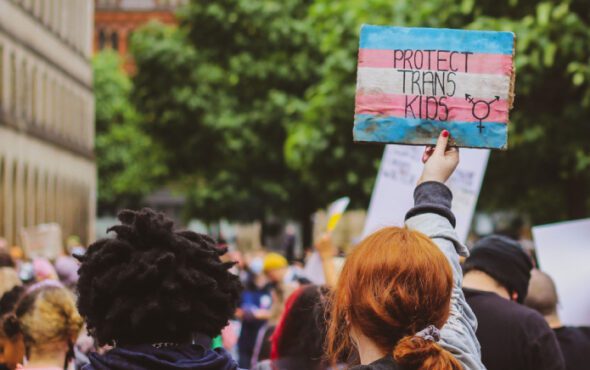
The government has released a new draft ‘non-statutory guidance for schools and colleges in England’ for children questioning their gender, after initially promising this in 2018.
Teachers have been advised to inform parents if their child wishes to change their gender identity at school.
Information will be withheld if the pupil is considered to be at “significant” risk of harm, though this will only be in “exceptionally rare” circumstances.
The guidance has been created “to provide clarity for schools and colleges, and reassurance for parents” and will not be compulsory for schools to follow.
The new provision has listed the overarching principles that underpin the guidance, which was released on 19 December.
These included taking “a cautious approach” and there being “no general duty to allow a child to ‘social transition’”.
Furthermore, it states that “schools and colleges have specific legal duties that are framed by a child’s biological sex.”
It continued: “While legislation exists that allows adults to go through a process to change their legal sex, children’s legal sex is always the same as their biological sex.”
No one will be “compelled” to use the pronouns a student wishes to be referred to as
The new guidance also provided clarity on how teachers should approach which pronouns to use for pupils.
Primary school aged children aged five to 11 “should not have different pronouns to their sex-based pronouns used about them”.
For children older than this, it is down to the discretion of the school, alongside consultation from families of the pupil.
The document further stated that no one will be “compelled” to use the pronouns a student has asked to be referred to as and that teachers can continue to collectively address a group of students as ‘girls’ or ‘boys’ even if a gender-non conforming pupil is present.
Students who do share that they wish to socially transition will not be permitted to use the single-sex spaces that align with their gender identity under the new guidance.
Schools will be allowed to make provisions for these students to use a singular toilet that “should be secured from the inside for use by one child at a time, including for hand washing” if they wish to.
Uniform codes will remain school specific. Schools set “their own rules and should enforce them fairly and equally.”
“A child who is gender questioning should, in general, be held to the same uniform standards as other children of their sex at their school and schools may set clear rules to this effect,” the guidance continues.
In addition to the above, students will not be permitted to participate in the Physical Education (PE) classes that align with their gender identity.
“There can be no exception to this,” the guidelines stated.
It also said: “For competitive sports, schools and colleges should be aware that without separate sex participation, it is unlikely that they will be offering equal opportunities to boys and girls.”
The final area considered in the document is single-sex schools.
“Single-sex schools can refuse to admit pupils of the other biological sex, regardless of whether the child is questioning their gender,” it said. “A school cannot, however, refuse to admit a child of the same biological sex on the basis that they are questioning their gender.”
The governmental guidelines will now be subject to a 12-week public consultation before being finalised.
“The new trans schools guidance is cruel”
LGBTQIA+ rights campaigners have condemned the updated guidance for being “cruel” and having the potential to “endanger” trans children.
“No LGBTQIA+ child should be outed to their parents by their teachers or school, including trans and non-binary children. Guidance for schools should allow children to come out on their own terms. Not undermine or potentially endanger them,” LGBTIA+ / HIV activist Philip Baldwin said.
No LGBTQIA+ child should be outed to their parents by their teachers or school, including trans and non-binary children. Guidance for schools should allow children to come out on their own terms. Not undermine or potentially endanger them.
— Philip Baldwin (@philipcbaldwin) December 19, 2023
Jo Maugham of the Good Law Project, a UK-based organisation that uses the law as a tool to do good, added: “The new trans schools guidance is cruel and puts the ‘anti-woke’ ideology of Ministers before the welfare of young people. Many studies have shown that affirming delivers better outcomes. I am distressed that best outcomes for children have ceased to be what matters most.”
The new trans schools guidance is cruel and puts the 'anti-woke' ideology of Ministers before the welfare of young people. Many studies have shown that affirming delivers better outcomes. I am distressed that best outcomes for children have ceased to be what matters most.
— Jo Maugham (@JolyonMaugham) December 19, 2023
Kate Osborne, Labour MP for Jarrow, has said: “This guidance like many of this Govts policies is cruel & unworkable – it’s upsetting to think of how many trans kids will see this come up as news today when in school & feel unsafe. The “guidance” is non-statutory, I hope schools put their students’ needs ahead of Govts hate.”
This guidance like many of this Govts policies is cruel & unworkable – its upsetting to think of how many trans kids will see this come up as news today when in school & feel unsafe.
The “guidance” is non-statutory, I hope schools put their students' needs ahead of Govts hate. pic.twitter.com/IBVLeObJfN
— Kate Osborne MP (@KateOsborneMP) December 19, 2023
Mermaids UK have released an official statement that read: “All young people deserve an accepting and supportive school environment to learn and be their authentic selves.
The UK Government’s draft trans guidance for schools in England seeks to prevent that. Its approach is unworkable, out of touch and absurd.
“Rather than listening to trans young people and reflecting best practice of inclusive educators across the UK, the Government has created more confusion for schools and is putting young people at risk.
They added: “It is difficult to understand how aspects of this draft guidance, including automatically excluding trans pupils from facilities, sport bans or allowing students to be misgendered are compatible with existing equalities law.
“The overwhelming majority of teachers and parents believe trans pupils should be safe at school and will disregard these discriminatory guidelines, which will be non-compulsory.”
Stonewall have added to the critique of the draft guidance in an official response. “The UK Government’s draft trans guidance for schools does not put the best interests of children first, and as such is simply not fit for purpose.
“Not only is it legally unworkable and contrary to existing equality law and the government’s own guidance on safeguarding – it is actively dangerous. If implemented it would inevitably lead to real harm being caused to trans children and young people across England.
They continued: “While non-statutory, it has the potential to have a chilling effect akin to Section 28, leaving children and young people who are trans or questioning their gender exposed to bullying and harassment.”
Galop flagged in a statement posted on X (formerly Twitter) that: “The guidance states that it would be very rare for a child to be at risk of significant harm in the event of the school informing their parent or carer that they are questioning their gender.
“Galop’s evidence suggests this is incorrect and as such we believe this advice will lead to dangerous situations for some trans and non-binary young people.”
Galop's statement on the non-statutory draft guidance for schools and colleges on gender questioning children pic.twitter.com/IwVoC2NUHS
— Galop (@GalopUK) December 19, 2023
The full draft guidance can be found here.



